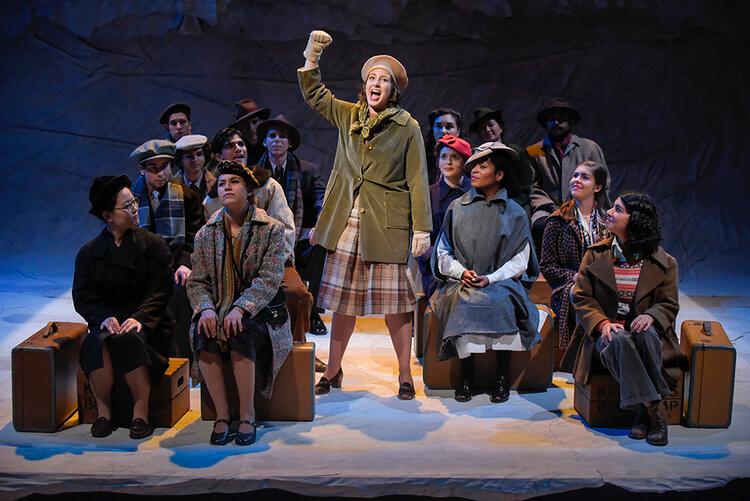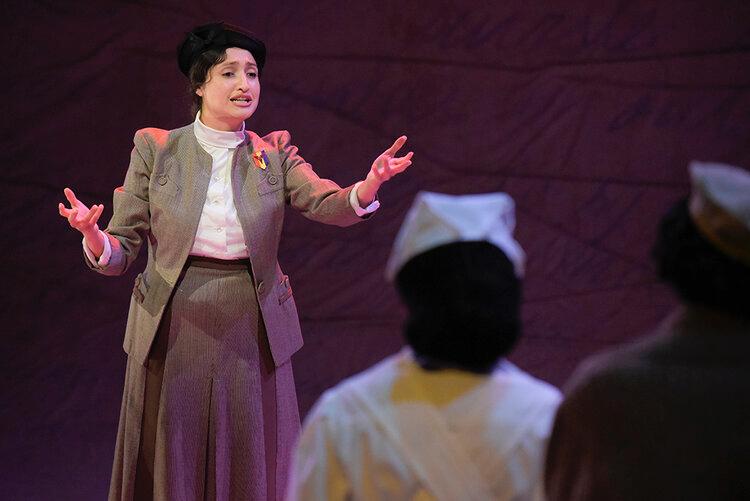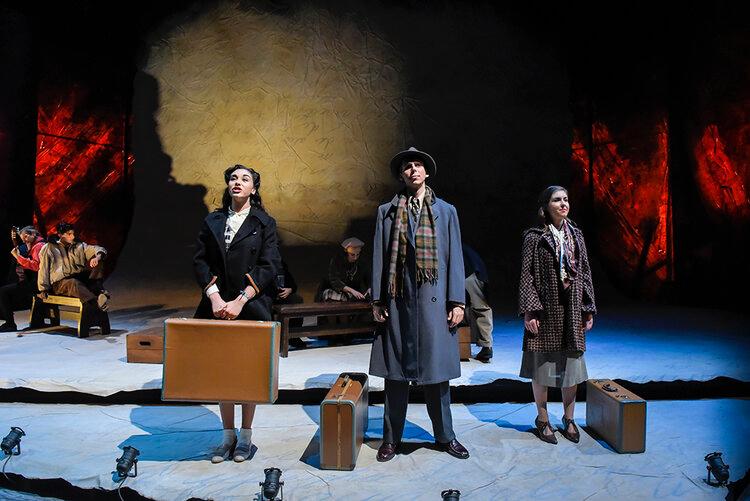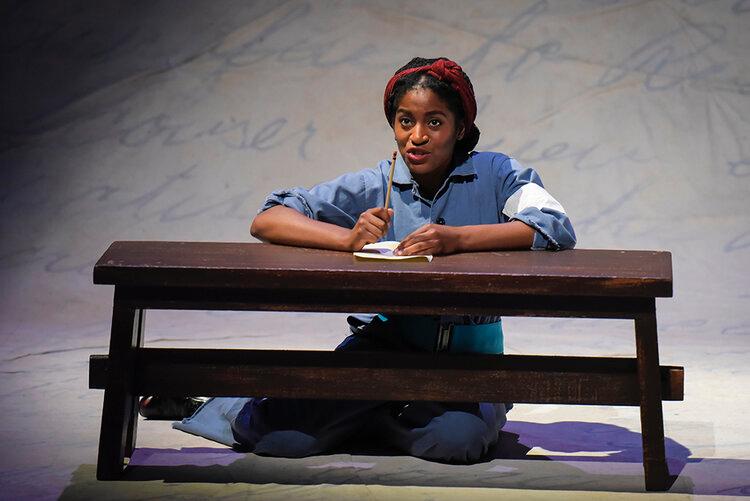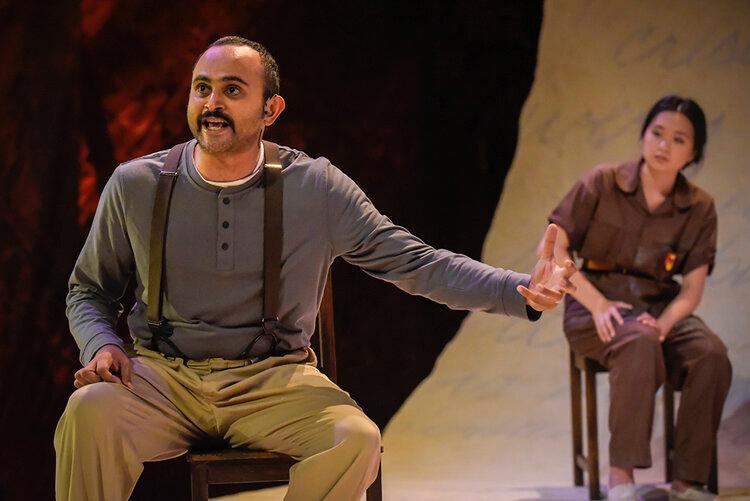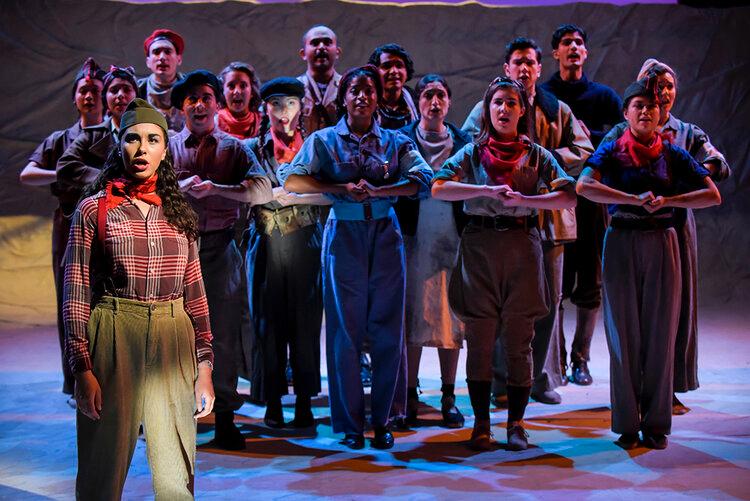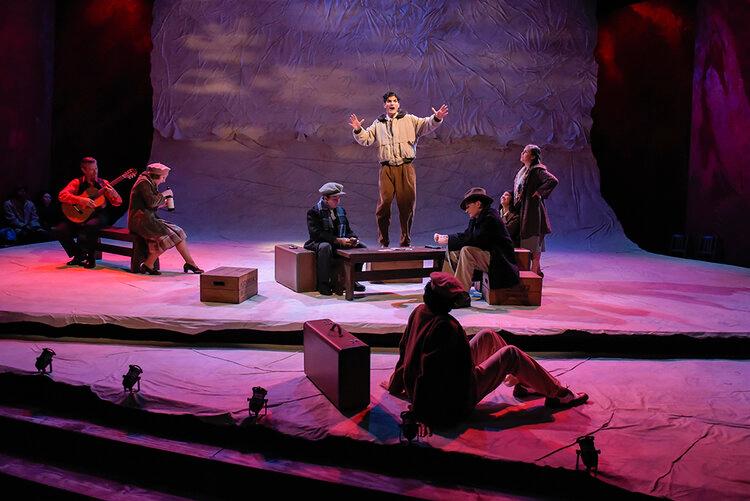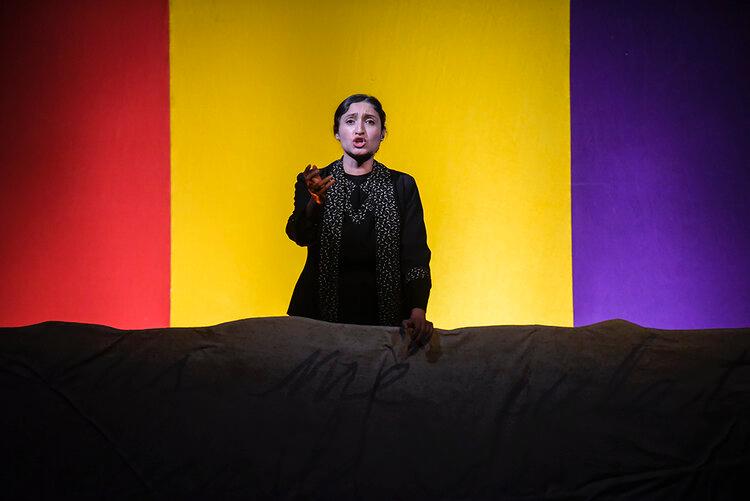Heart of Spain A Musical of the Spanish Civil War
book and concept by music by lyrics by Peter Glazer Eric Bain Peltoniemi Eric Bain Peltoniemi & Peter Glazer
with sections adapted from original sources
UC Berkeley Final Version
Epigraph
Only that the lines shall hold! nothing else matters there is no hardship no anguish no other pain Dig the trenches deep and crooked send shells and tanks and planes fuel and the best guns to the Front Let civilians feed wells of supply guard crossroads keep the highways healthy pulsing hot as the blood in our foreheads Let the lines hold hard then advance let those camions wind over mountaintops let the color of the flags never fade Hold them high as they flow above the roaring camions: let the memory of the songs the volunteers sang never die from our throats.
James Neugass, Lincoln Brigade veteran from his poem "Give Us This Day"i
When Bergamin speaks about the people, his cheeks begin to glow and his face takes on an almost ecstatic expression. For him the people are not what they are to the Fascists: a dull mass of low humanity kept in bondage by a small group of rulers; for him the people are the chaos from which a new world is born, the unfathomable reservoir of forces from which every thinker and poet, who does not want to be shut off from life, must draw.
Jef Last in "From Spanish Trenches" edited by Marcel Acierii
The Company
(This is an ensemble piece. All actors play more than one part. Principals each have a featured role, named below, but often play other roles as well. Character descriptions below are guidelines based on these featured characters. To track each actor through the play, each member of the cast is given a stage name based on the names of cast members in the May, 2000 production at Northwestern University. When, in certain scenes, actors names are used without a corresponding character name, these performers are involved in narration, direct address, or singing without a specific defined character. They act as Narrators or, in the traditional Greek sense, Chorus. When lines are attributed to "Ensem," this indicates material or characters yet to be assigned to particular actors. These assignments will be made during the rehearsal process.)
Men (featured characters)
Andrew 35 year old African-American
Arthur 25 year old Jewish New Yorker
David 22 year old Italian-American
Fernando -- 20 year old Hispanic
Henry (or Henrietta) 40 year old character actor
Juan 30 year old Hispanic
Women (featured characters)
Alice 25 year old white American
Dorothy 22 year old African-American
Margaret 25 year old Spaniard
Maria 40 year old Spaniard
Ensemble: 4 to 8 actors
Musicians:
Four to six, depending on doubling possibilities; could number ten to twelve if budget allowed, adding strings and horns; some or all of the musicians may be used as actors in the larger scenes. Minimum:
Flamenco Guitarist
Percussion (various drums, bells, etc.)
Keyboard Bass
Act One Scenes and Songs
Prologue/Poem - "Postscript to a War" [poem by Edwin Rolfe]
Scene One - The Trench
The Soldier's Song
Scene Two - The Times
Scene Three - Union Square
Soup Song [parody written in period by Maurice Sugar]
'Cross The Ocean
Another America (The Popular Front Song)
Scene Four - The AFL Convention
Come To Spain
Scene Five - Three Conversations
Don't You See
Scene Six - Recruitment and Departure
Scene Seven - The Journey to Spain
"¡Penas! ¿Quién osa decir que tengo yo penas?" [poem by José Marti] Arriba, Mis Compañeros!
Yo Soy Un Hombre Sincero [musical setting of poem by José Marti]
'Over The Pyrennes' [adapted from prose by American vet Edwin Rolfe]
Scene Eight - The Commissar Speaks/Over the Top
Quartermaster Song [song popular during Spanish Civil War]
Si Mi Quieres Escribir [song popular during Spanish Civil War]
El Quinto Regimiento (Venga Jaleo) [song popular during Spanish Civil War]
Viva La Quince Brigada [song popular during Spanish Civil War]
Act Two Scenes and Songs
Scene One - The Parachutist [adapted from prose by German writer Bodo Uhse]
Fraulein Death (The Parachutist's Song)
Freiheit (Die Thälmann-Kolonne) [German anti-fascist anthem]
Scene Two - Nurses' Letters Home [adaptions of letters collected by Marcel Acier in In Spanish Trenches]
Jarama Valley [song popular during Spanish Civil War]
All Our Lives
Scene Three - The Interrogations
All the Kings of Spain
Scene Four - Another Letter Home
Scene Five - The Burns Night Celebration
"The Soldier's Joy" [poem by Robert Burns]
My Father Was A Farmer [setting of poem by Robert Burns]
The Good Fight
Vientos del Pueblo [setting of poem by Miguel Hernandez]
Scene Six - Pasionaria Farewell Speech to Internationals [speech by Dolores Ibarruri]
Scene Seven - Lincoln Brigade Vets Look Back [adapted from interviews collected by John Gerassi in The Premature Anti-Fascists]
May Your Enemies Surrender
Setting
Heart of Spain, as imagined here, is staged in a full 3/4 thrust. The stage itself is a rectangular platform, backed by a painted wall unit. The wall evokes both the destruction and idealism of this war. It contains both realistic elements (remnants of propaganda posters, architectural details, etc.) and emotionally resonant abstractions. Downstage of the wall off of its stage left end is a pillar reaching to the grid, with a few steps at the bottom from a broken spiral staircase. A low stone wall cuts across the stage at an angle, used as a barricade for the two trench scenes. A long, three-foot to four-foot section of the stage floor, running upstage right from down center and hinged on the downstage end, can raise to a variety of heights to create a raked platform for various scenes, or remain flush to the rest of the deck. Surrounding the stage platform on three sides is a moat, one foot below the level of the stage. This moat is lined with chairs and benches where the cast sits through much of the performance. When seated there, the actors essentially become the first row of the audience. The chairs and benches are used as furniture in various scenes. The band is located in the upstage right corner of the space.
Prologue/Poem -- "Postscript to a War"iii
(The house lights do not fade to half to signal the beginning of the performance. Once the audience has settled in their seats and the lobby doors are closed, the actors enter to the moat on the edges of the stage area, and 4 of them move up onto the deck. The lights there might brighten slightly. One actor looks out at the audience, getting their attention by virtue of her presence and the presence of her fellow actors. After a few moments, she speaks the opening lines of Edwin Rolfe's poem "Postscript to a War," written in 1939. The lines are delivered with confidence, clarity, and a deliberate pace that allows the audience to grasp the meaning. She speaks from the perspective of the poet, a volunteer with full knowledge of the war, its implications, and its immediate aftermath. She adopts his point of view, not his person. The first word of the play, "we," should include cast and audience. Each actor takes a similar stance, and each works to engage the audiences' eyes. They act as a Chorus might, laying some of the groundwork for the play to come.)
Veronica: We must remember cleanly why we fought, clearly why we left these inadequate shores and turned our eyes, hearts, Spainward.
Eddie: We must never lie to ourselves again, deceive ourselves with dreams that make sleep sluggish.
Alyssa: Our world is new now, clean and clear:
Shauna: our eyes can see the perfect bone and tissue now, remembering
Briunia: the flesh cut open,
Melissa: the gangrened limbs,
Vaisakh: the rot that almost, almost . . . but did not reach the heart.
Ali: And if we find all known things changed now, after two years amid fabulous truth;
Boris: if we find dulled the once sharp edges of trivial loves;
Isabel: even if we find our truest loves indifferent, even false
Yohana: we must remember cleanly why we went,
Harry: clearly why we fought;
Alex: and returning, see with truth's unfilmed eye what remains constant,
Yoonji: the loyalties which endure,
Josie: the loves that grow,
Claire: the certainties men, and women need, live for, die to build,
Akash: the certainties that make all living tolerable.
Veronica: (after a pause) "Postscript to a War" by Edwin Rolfe, Abraham Lincoln Brigade volunteer, February 24, 1939.
All: We must remember cleanly why we fought . . .
(The guitar immediately begins a to play a dramatic flamenco instrumental as an introduction to the next song. With it, the houselights fade to half and out.)
(The guitar immediately begins a to play a dramatic flamenco instrumental as an introduction to the next song. With it, the houselights fade to half and out.)
ACT I
Scene One/Overture - THE TRENCH
(During the guitar solo, five actors move across the stage to a low wall, representing a defensive trench on a battlefield. As they cross the space, they are picking up rifles appropriate for the time and place, Spain in the 1930s. The settle against the wall, their protection from an imagined battle beyond. An actor from the ensemble steps onto the deck and delivers the scene title, as others will do throughout the piece.)
Yoonji: Act One, Scene One. The Trench.
(They position themselves as at the front line of a war. Lights focus on them. It could be an image from any number of wars a group holding a position during a lull in the battle. We hear sporadic gunshots, occasionally deep booms in the near distance. And there is wind, haunting and lonely. It is a restless tableau. It conveys tedium, tension, anxiety, readiness, danger, exhaustion, and it's cold.
The flamenco introduction leads into The Soldier's Song The rest of the company is spread around the peripheries of the stage, the Chorus for this scene. They observe the action, and with their lyrics, describe it.
The lights have also begun to build on the soldiers. Four are volunteers in the International Brigades. The fifth is a member of Spanish militia, a woman. They all wear the often makeshift but formalized uniforms of their respective groups.
The woman from the militia is on watch, peering over the lip of the trench with binoculars. The men are crouching or sitting, guns at the ready, waiting.
The Chorus sings about the five in the trench; sings their thoughts. The Soldier's Song begins with a quiet intensity, and builds in power verse by verse. A quarter of singers begins the songs, and the remaining members of the company join in as the song builds.)
Shauna, Veronica
They haven't slept in days, Josie, Boris: Can't help but dream of sleep. A comrade's resting hard; The watch is hers to keep.
(One of the characters in the trench speaks the lines expressed in the song at the end of each line in an intense whisper.)
"This quiet's just too much! (This quiet's just too much!) I wish they'd make a move! (I wish they'd make a move!) We're stuck in such a spot! C'mon, now! Make a move!" (C'mon now! Make a move!)
They're doing what's been told. No need to understand? They're shaking from the cold. They're following the plan.
They crave an end in sight, Some signal they could win. Some cheering in the night! Home's journey to begin.
But patience is a must, And what they cannot feel, When all that they can trust Is destiny and steel.
Add Claire, Alyssa
This is her native land. Vaisakh: They've come from lands away. They've come to lend their hand. And saw the worst today.
They came here with a cause, They came to turn things right, If killing gives them pause They're bound to kill in spite.
They fight what country's war? This fight so far from home. First heard the bombers' roar 'Cross oceans white with foam.
Whose patriots are these? In what bright moment caught?
All:
Whose flag slaps in the breeze? What new world will be wrought?
(Those in the trench join in on the singing, taking the answers at the ends of the lines in the first of these two verses, and the beginnings of the lines in the second. They stand, rising out of the scene of battle to comment on their lot.)
What brings them to this place?/to this place What righteous cause inspires?/cause inspires Whose blood are they to bleed?/blood to bleed Whose bullets do they fire?/do we fire
Whose patriots are we?/Who are we? What moment do we seize?/do we seize . . . What light so shining see?/shining see . . . A flag snaps smartly, brightly in the breeze.
(The song has built to a high emotional pitch. Everyone is singing now. Fragments of lines from the song sweep through the company. The wind blows.)
What brings them to . . .
This is her land . . .
Whose bullets do . . . To lend their hand . . .
They crave an end . . . They fight whose war . . . Some cheering in . . . The bombers roar . . .
What righteous cause . . . They're bound to kill . . . What gives them pause . . . What new world will . . .
'Cross oceans white . . . Bright moment caught . . . To turn things right . . . What new . . . world . . . wrought.
(The cast spreads across the stage, the vocals sustaining.
In perfect unison, the music ends.)
End of Scene
Scene Two - THE TIMES
(Lights restore, and the actors release from their poses at the end of the song. They adjust into positions around the stage, and set the scene of our country before the Spanish Civil War. They speak with energy, confidence and, at times, necessary irony. The story they tell should both inform and entertain.)
Claire: Scene Two The Times.
Vaisakh: To grasp the Spanish Civil War, to feel it, one must first remember the times.
Alyssa: The First World War was the first war worthy of that name. Eighteen million people died between 1914 and 1918, less than half of them soldiers. Tens of thousands of Americans lost their lives in less than a year, and a peace movement began on college campuses and around the country.
Boris: "A rising note of pacifism, if sounded long and loudly enough by this generation, may somehow penetrate the ears of those who, it seems, will never learn to see."iv
Yoonji: Many thought U.S. involvement in the Great War had been a mistake; that war rose from capitalism and imperialism. Dupont's profits went from 6 million dollars to 58 million dollars during the Great War; U.S. Steel's jumped from 10 million to 239 million.
Veronica: "The master class has always declared the wars, the subject class has always fought the battles," said Socialist Eugene Debs.
Ali: "I'll go to war on one condition," said a student "that the man on my right shall be the son of the President of the United States, the man on my left shall be the son of the House of Morgan, and the man behind me shall be the son of the Secretary of War."
Akash: In World War One's aftermath, Mussolini rose to power in the 20s, the Stock Market crashed in '29, Hitler became Chancellor of Germany in '33 and "President" in '34. And on the other side of the political fence, the Russian Revolution in 1917, also a response to the Great War, brought Communists to power for the first time. The workers of the world were a force to be reckoned with.
Josie: In the depths of the Depression, those asking for higher wages were accused of being Communists; workers wanting unions, safer
factories, saner hours all dirty Reds. One labor organizer was beaten so many times for being a Communist that he decided to become one.
Claire: Lines were drawn between left and right, between pacifists and advocates of collective security, between liberals and reactionaries,
Boris: working class and ruling class,
Alyssa: reds and conservatives,
Melissa: proletariat and bourgeoisie;
Akash: Communists,
Josie: Socialists,
Briunia Marxist-Leninists,
Eddie: Trotskyites,
Shauna: anarcho-syndacilists
Alex: An anti-war protest at Harvard in 1934 was disrupted by a group of 'patriotic' students in Nazi uniforms. "Only Harvard students had the ingenuity to pose as Nazis."v
Briunia: Universal Studios in Hollywood produced a movie called "Fighting Youth." It was about a Communist plot to destroy college football.
Isabel: Workers and their families were suffering as they never had before. Two teachers and a lawyer in Chicago fought over a job washing windows at ten cents per. A Methodist minister hoped to make fifteen cents a ton unloading garbage trucks.
Harry: Trade-unionism produced some of our most passionate political animals. Henry Ford despised the unions for empowering the workers and threatening his profits. The New York Times called Ford "the Mussolini of Detroit."
Yohana: While Jews were being persecuted in Germany, America had its own brands of fascism. A black was lynched in the South once every three weeks in the mid-thirties. Father Coughlin preached anti-Semitism on American radio and the German-American Bund waved swastikas on American streets.
Melissa: The Communist Party flourished, actively supporting trade unions and racial equality, and defending the unemployed. "The Communist Party had the only platform which recognized the reality of my life," said a black Chicagoan.
Eddie: The Japanese threatened Mongolia in 1935, and Mussolini invaded Abyssinia Ethiopia the same year. FDR's government wasn't about to get involved overseas, but the left and the liberals and the students and the workers found it increasingly hard to swallow fascist oppression and murder.
Shauna: How could they fight for social justice at home and ignore what was happening overseas?
Vaisakh: Events in Europe tested our instincts for justice. Fascism forced us to define ourselves. It was only a matter of time.
End of Scene
Scene Four - THE AFL CONVENTION
(A hallway outside a large meeting room at the AFL convention in Tampa. We hear the sound of the convention in progress. David and Alice enter quickly from one of the voms.)
David: They won't let her speak. Do you believe it?
Alice: Do they know who she is?
David: They know exactly who she is. The rank and file want to hear her, but the officers are so preoccupied with their own damn politics that they don't have time for hers.
David: We've got to get her up there.
Akash: Scene Four American Federation of Labor Convention, Tampa, Florida, later that month.
(The doors burst open again. Maria, a woman from Spain, comes out with a union official.)
Union Official
(Josie): I'm sorry, Miss Acosta. We have great sympathy for your cause. We just don't feel it's appropriate for you to address our members from the podium.
Maria: Is this not the most important labor organization in America?
Union Official: Yes. It is.
Maria: You represent many skills, many workers?
Union Official: We do.
Maria: Then it could not be more appropriate. The parties in Spain fight often and loudly but we are united in support of my Government, a Popular Front united against fascism. The American Federation of Labor does stand united against fascism?
Union Official: Of course we do, and . . .
Maria: Anti-fascists from all over Europe are coming to Spain. They fight on the barricades of Madrid to save our city, a workers' army.
Union Official: I understand, Miss Acosta. But your speech would be out of order. I must . . .
Maria: You must let me speak.
Union Official: I'm sorry. (The official tries to exit. She stops him.) I'm sorry! (Official exits.)
Maria: (To Union Official, as she goes back into the meeting.) What are you afraid of?
(A pause.)
David: You'll speak here.
Maria: (Not understanding.) Here?
David: Yes. Right here. Just a minute. (He gets a chair from beside the door and pulls it away from the wall to offer her a seat.)
Maria: Yes. Thank you. (She sits.)
David: (To Alice.) Would you . . . (indicating Maria as he heads for the doors of the room to gather an audience.)
Alice: Of course. (She pulls another chair next to Maria and sits.)
David: (Over his shoulder . . . ) A minute!
Alice: Hello.
Maria: Hello.
Alice: (Taking out a pad.) You will speak to the group when they gather.
Maria: Yes. It would be better inside, but I will speak here. (Seeing the pad.) You are a reporter?
Alice: Only if they print it. (She holds up the pad.) Do you mind?
Maria: No, please, go ahead. (Beat.) I think they will. Print your words. Very few representatives of the Spanish government are here in the United States now. (She smiles.) I think I'm . . . good . . . news.
Alice: Why do you think they wouldn't let you speak?
Maria: They can't let themselves be identified with the work of the Communists. Without the Communist Party, there would be no International Brigades.
Alice: What is the situation in Spain right now?
Maria: Madrid is under attack by the fascists, but the militias defend us, save us, and the Internationals.
Alice: (Pause.) You look tired.
Maria: The traveling . . . and I worry about my family, my friends. But not tired. Truly.
(The doors burst open yet again. David returns with four or five others. Arthur is among them. Musical underscoring begins . . . energetic, urgent. David closes the doors.)
David: Everyone, could you quiet down please. As you know, the executive council has refused our request to allow Miss . . . (he looks towards Maria)
Maria: Acosta.
David: Yes, of course, I'm sorry . . . Miss Acosta . . . to speak before the meeting. She's come all the way from the Spanish Consulate in Washington. She will speak to us here, now. She has come from Spain.
Maria: Yes.
David: She is the . . .
Maria: Thank you. You've been most helpful.
David: (Embarrassed) Thank you. (He moves away.)
(She gets up on a chair and begins to sing Come to Spain.)
Maria: Comrades.
My name is Maria Acosta and I am here representing the democratically elected government of Spain
the democratic government of Spain
I come here at a time of urgent need (I wish I knew how much they know) On fourteen April nineteen thirty-one just six short years ago (and so, so long) after sweeping voting triumphs through our land the Second Spanish Republic was proclaimed the Second Spanish Republic was proclaimed and the King, he ruled no more
Finally, we were heard, began our work, but oh, the changes were so slow, factions fought, trouble came ground was lost and ground was gained there was so far to go churches were shut down, yes even burned call it revenge against complicity with landowners and generals to keep the working class in abject misery Huge estates divided up among the families whose toil had made that land their own throughout the centuries
But the rich men and the generals they could not bear the change and so conspired to overthrow, to end us the democratic government of Spain
(She speaks over the music.) Comrades.
General Franco has invaded his own country like a foreign conqueror -swarming up from Morocco with an army of Legionnaires and mercenary Moors. His arms, his planes, and his courage all courtesy of his devoted friends, Hitler and Mussolini.
German bombs are falling on Madrid in a rain of terror, trying to break the Spanish will, burning metal falling on the new flowers of liberty.
But the Madrileños are resolute. Workers, men and women like you, taking up arms. Whole families in the trenches, children bearing water,
mothers bearing arms, and joining them at the barricades, volunteers from all over Europe, a new International Brigade.
Because this is not just a Spanish fight. This fight is for the working class. This fight is for the world.
(She sings again.)
(Chorus)
Oh, Come to Spain!
You're needed there in ways this world has never known before Oh, Come to Spain! If we don't stop them now there's sure to be another war The "war to end all wars"it won't be called that any more; So, Come to Spain!
Oh, Come to Spain! Please, Come to Spain!
(She speaks.)
Your government, Britain, France, all refuse to take a side. But this refusal strangles Spain. What side does Hitler take? No side? What side Italian troops and guns? Isolation seekers, just like you? Nonintervention for them too?
(She sings again.)
. . . so, now I come to you for the best that you can do this world will crack in two! and you know what you must do please, take a stand, please, take a side, and
Come to Spain!
You're needed there in ways this world has never known before Oh, Come to Spain! The rights you fight for here are just the things we're fighting for
It's more than just one land, it's peace and justice can be saved. The trenches of Madrid must soon become the fascists' grave. No pasaran! we cry, for we shall never be enslaved. So, Come to Spain! Oh, Come to Spain! Please, Come to Spain!
Members: Workers of the world, unite, The time has come to turn things right! This is what we're fighting for Not a Europe bathed in gore
Members and Maria: The "war to end all wars"it won't be called that any more Maria: So, Come to Spain!
Members: Oh, Come to Spain!
All: Please, Come to Spain!
(Her gathered audience applauds; Maria nods in acknowledgment. David shakes her hand. The lights fade.)
End of Scene
